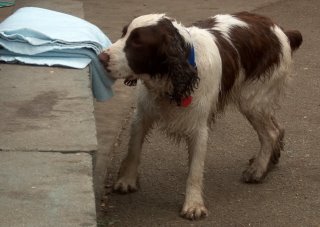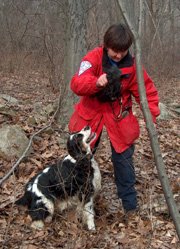AKC NEWS ALERT AB 1634 - The More Than $100 Million Mistake
June 2007 Update: Our assemblymen did not get the message as they passed (barely, by ONE vote after HOURS of behind-the-scenes arm-twisting) this measure. It now goes to the Senate as its next step. It could then be modified and, if so, it would have to come back to the assembly for vote. It may ultimately go to
the Governor for signature; so, contacts to his office would be appreciated. For now, I urge everyone now to contact your California Senator to express your disapproval for AB1634, asking that they vote "no" when it might come for a Senate vote. Don't be afraid to do this multiple times, like every other day, so they get the message. Share with other dog lovers. Here is a link to find your Senator:
Find Your Senator.
In another development, because the
California Veterinary Medical Association's Board of Directors initially sponsored AB1634, there has been surprise expressed & discontent among California's veterinarians who do not agree with the bill's premise. In an upcoming CVMA meeting, it has been scheduled for discussion & reconsideration. Watch to see what happens after the Anaheim meeting which concludes June 24. I am working on sharing PDF files of letters from prominent veterinarians to the CVMA asking they remove their name from sponsorship. I ask you print out & share with your vet, urging them to take a stand on this very important issue.
=========================================After passing the Assembly Business and Professions committee, California Assembly Bill 1634 has been referred to the Assembly Appropriations Committee. This is a new step in the legislative process requiring that all breeders and concerned dog owners write this new committee to express your opposition to AB 1634, as your previous letters to the Assembly Business and Professions committee are no longer valid. It is imperative that when writing your letters of opposition, please state that you “oppose AB 1634, as amended by the Business and Professions Committee on April 24th.”
See either AKC.org for links to obtain names of Appropriations committee members, and the name of your own assemblyperson, and sample letters.
I am going to refer you also to
Save Our Dogs as this is a well-organized site. They do a better job of laying out why this bill should NOT pass. I'm going to share here what I also found posted on a veterinary medical email list concerning early or so-called pediatric (4-month-old) spay/neuter:
From VetMed List
Date: Sat, 21 Apr 2007 11:31:41 -0700
From: Bridget Curry
Subject: Re: early spay/neuter
Permission to cross post
From: Laura Sanborn
To: CARDA@yahoogroups.com
Sent: Thursday, April 19, 2007 1:49 PM
Subject: [CARDA] Spay/Neuter Impacts, etc.
Yesterday I made the rounds at the state capital to visit the
offices of the Assembly Business & Professions Committee members to discuss AB1634.
I was accompanied by two police officers who discussed the harmful impacts AB 1634
would have on law enforcement. Also with us was the person in charge of the breeding
and training program at Canine Companions for Independence (CCI), who discussed how
AB 1634 would harm programs that assist blind and disabled Californians. He also
represented Assistance Dogs International, Inc., an umbrella organization over many
guide/service/hearing dog organizations. Similar to guide dog programs, CCI breeds
and trains dogs to assist disabled people. They use Golden Retrievers, Labrador Retrievers, and Golden/Labrador mixes. CCI breeds over 600 dogs a year. My jaw nearly hit the floor when the CCI representative started describing
research that CCI did in the early 1990s to understand spay/neuter impacts.
CCI wanted to know if early s/n (less than 6 months of age) would yield results at
least as good as their traditional spay/neuter age, which is usually over 12 months
of age (typical is 17 months of age). So CCI did a controlled prospective research study... the gold standard of
research. They assigned half the pups in a number of litters to be s/n early, while
the remaining pups in these litters were s/n at their traditional age. The results
were very unexpected. The early age spayed females were significantly more dog
aggressive than the traditional age spayed females. Urinary incontinence was a
much bigger problem in the early spayed females compared to the traditional age
spayed females. The early age neutered males were more fearful than the traditional
age neutered males. The bottom line is that the early age spay/neuter
dogs had a significantly higher failure rate in CCI's program... a
smaller percentage of them grew up to be working dogs. CCI will not spay/neuter
dogs before 6 months of age, and usually wait until dogs are more than
12 months old to spay/neuter. The CCI rep said this research has been
repeated by others. I believe one of them may be Guide Dogs for the
Blind, as I was told by one of their trainers that they recently stopped
doing early spay/neuter owing to results they were seeing that they
don't like.
I spent 6 years poring over the veterinary medical research literature
trying without success to find research of this type, and here I was
sitting in the office of a state Assembly member, listening to a
scientist describe the work that his group did. It has not been published
anywhere. Needless to say, I spent the rest of the day bugging him
to get this published. This has implications far beyond AB 1634 and
guide/assistance dogs. It has implications for the health and well being
of most dogs. There are very few controlled prospective research studies
of dogs in veterinary medicine examining spay/neuter impacts. They are
too costly for almost all researchers to do. Guide & assistance dog
programs may be in a unique position to do these kind of studies, as
they breed many dogs and they maintain a degree of control over their dogs that is
beyond what other breeders can do. CCI's work is summarized in their
letter to the California state Assembly opposing AB 1634. Quoting from CCI's letter:
Calling AB 1634 the 'California Healthy Pets Act' is a misnomer
Surgical sterilization of preadult dogs has been shown to increase the risk
for several significant behavioral and health problems. CCI did a study
on the effects of prepubertal gonadectomy (i.e., sterilization) in 1990,
and found significant increases in failure rates due to both medical
and behavioral reasons in those dogs that had been sterilized early.
This research has been repeated elsewhere with the same results.
Increased incidence of health problems such as urinary incontinence,
osteosarcoma, hemangiosarcoma, obesity and orthopedic problems as well as
behavioral problems such as environmental fear and interdog aggression are
strong arguments against prepubertal sterilization for any dog, but
especially those destined for a working role.
http://saveourdogs.net/documents/CCIPosition.jpg>
I am also going to share that the ONE litter of three pups I've bred in my 30 years in the breed: One was spayed earlier than planned due to necessary other surgery, and she is now exhibiting dog aggression, has significantly longer and thinner legs than her littermates, one of whom was spayed at or later than the "normal" time of 6-7 months, and the other whom is intact. This first pup has also incurred a FRACTURE in one of those longer, thinner, perhaps weaker bones. This might not have occurred had there been warnings or knowledge about these risks. Now we find California lawmakers want to
FORCE all of us to spay/neuter all of our dogs at 4 months of age! Beyond the age factor, do we need someone TELLING us what to do with our dogs? I read an article recently saying these so-called "nanny" laws are becoming more and more common. At what point, do we say "enough!" ??
Now for my observations from my rescue work, reducing the numbers of breeding animals will very nicely drive up puppy prices, which for my breed are already between $700-1000 per puppy. This will put puppies out of range for "normal" blue-collar people; they will just find intact animals, not license them and breed their own puppies, selling off what they don't want for themselves for a tidy profit. The for-profit breeders will just have to find cladestine ways to advertise and sell their puppies: Perhaps via internet ads.
This is another possible scenario: As quoted in the Sacramento Bee article
Pet Neutering Bill Clears Committee: (AB1634) could
"backfire because some pet owners would abandon their animals rather than pay to sterilize them." Now that's not a pretty picture, eh?
Now, don't think I've gone to the
Dark Side. I am SO FOR responsible dog ownership, FOR responsible dog breeding that it hurts. And I think some of this action pushing this bill comes from a positive motivation to make animals' lives better. But I am also leery that PETA and HSUS are driving forces (and probable $$ contributors to AssemblyMan Lloyd Levine). PETA is vehemently anti-pet, is working towards eliminating pet ownership entirely. Don't you suppose a good way to begin might be to limit dog/cat breeding as a first step? In fact
Save Our Dogs has an excellent introduction to PETA and animal rights organizations
HERE.
I like that they back up their opnions with references and other webpages for in-depth info.
If you come this far, I'm going to refer you to
Save Our Dogs for action but I'll just say you must as a loving responsible dog owner CALL or FAX a LETTER to your Assembly Person and the Governor ASAP registering, as AKC said, your
"vehement opposition to AB 1634" and demand they vote
NO on AB1634.
PS: My link to the SacBee article won't work; so, I'm going to append that article below as I believe it was the most balanced news article I've seen so far.
Pet neutering bill clears committee
By Jim Sanders - Bee Capitol Bureau
Published 11:23 am PDT Tuesday, April 24, 2007
Legislation to require sterilization of nearly every dog and cat statewide in hopes of reducing the burden on animal shelters cleared its first legislative hurdle Tuesday. The measure, Assembly Bill 1634, is meant to curb the impact of irresponsible animal owners by making fewer dogs and cats capable of reproducing. The Assembly Business and Professions Committee passed AB 1634 on a party-line vote, 7-2, with Republicans opposed. Public testimony on the bill, taken two weeks ago, attracted hundreds of animal enthusiasts on both sides of the issue.
Tuesday's session was limited to a statement by the author, Assemblyman Lloyd Levine, D-Van Nuys, and to questions or comments by committee members. Levine said a statewide spay and neutering standard is needed because cities and counties have limited control over feral or unwanted pets. "Dogs and cats don't know where one city ends and the other begins," he said. Levine contends AB 1634 would crack down on irresponsible breeding that leads to about a million unwanted pets being born each year, costing shelters an estimated $250 million.
Levine's bill would require that dogs and cats to be spayed or neutered by four months old. Violators could be subject to a $500 fine.
Exceptions are provided for service animals - such as police, guide or signal dogs - and for animals excused by a letter from a veterinarian because of illness, age or poor health.
The bill faces massive opposition, with critics claiming it would interfere with the rights of pet owners, pose a financial hardship on hobbyist breeders, be ignored by the worst offenders, and be largely unenforceable. Opponents note that animal shelter populations have fallen during the past 10 years, and that AB 1634 could backfire because some pet owners would abandon their animals rather than pay to sterilize them.
After Tuesday's committee vote, critics claimed the bill's exemption for service dogs does not go far enough to ensure that an adequate supply of puppies will enter such programs in years to come. Assemblywoman Shirley Horton, a San Diego Republican who voted against AB 1634, said she does not think the Legislature should mandate spaying and neutering. "I really do think this is a local issue," she said. Labels: AB 1634, AB1634, Assembly Bill 1634, California, California Senate, dog spay, Governor, HSUS, mandatory spay/neuter, neuter proposed legislation, PETA







